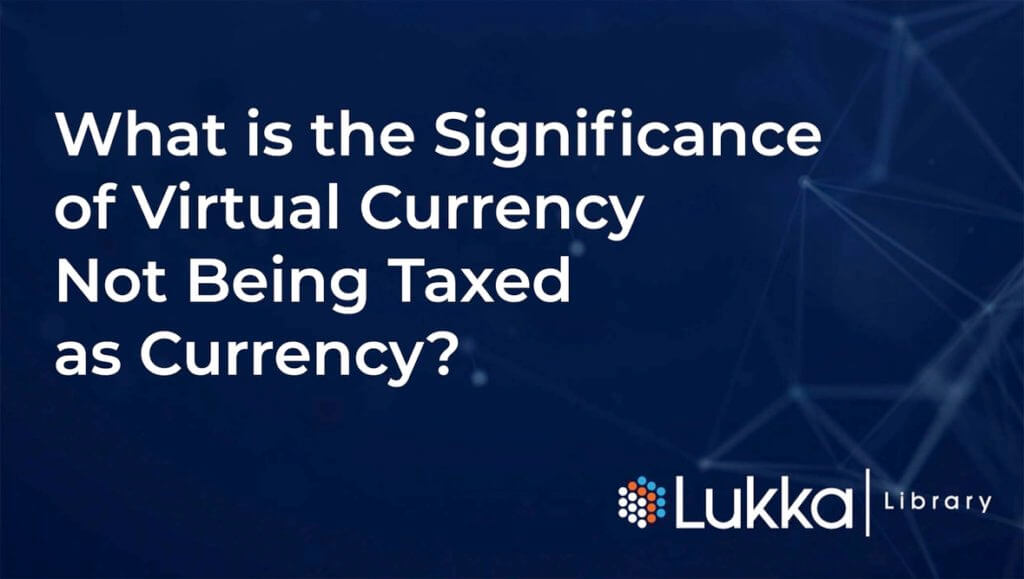
The statements in this document reflect guidance issued as of March 19, 2020.
Author: Andrea S. Kramer, McDermott Will & Emery
At the date of this Memorandum, no government (generally) treats any virtual currency as its legal tender or “fiat” currency, which means that virtual currency is not accepted as any country’s valid and legal currency.1 Although, virtual currency has a digital representation of value and it can be used as an alternative to money in some circumstances, it is not issued by a central bank, credit institution, or e-money institution.2
In Notice 2014-21, the IRS states its view that convertible virtual currency is property, subject to the general tax rules that apply to property transactions. The IRS explicitly says that virtual currency is not foreign currency,3 which means that virtual currency would not qualify for the special tax rules available to foreign currency transactions.4
Taxing virtual currencies as property—not foreign currency—has four major consequences for taxpayers.
- First, the taxation of many foreign currency transactions does not turn on the taxpayer’s tax status. Instead, many foreign currency transactions will generate ordinary income or loss without regard to the taxpayer’s tax status. Taxpayers who enter into virtual currency transactions, on the other hand, must determine their status as an investor, trader, dealer, hedger, miner, staker, or personal user.5 As a result, ordinary income or loss is only available to virtual currency users that hold virtual currency as ordinary assets or that are eligible to make certain elections into ordinary tax treatment. 6
- Second, each unit of virtual currency has its own tax basis, which requires taxpayers to track the basis of each unit or position they hold by identifying each individual unit or position they dispose of. 7 Taxpayers cannot rely on the average cost basis method for determining tax basis and calculating gains and losses as they can for their foreign currency transactions that they enter into for personal use (not for business or investment purposes).8
- Third, individual taxpayers cannot rely on the personal use exemption that applies to foreign currency transactions. This means that taxpayers must report gain or loss every time they sell or spend virtual currency units, with their gain or loss based on the change in their units’ value between the time they were acquired and when they were disposed of.
- Fourth, the $200 de minimis gain exclusion available to individual taxpayers for their personal use of foreign currency is not available to taxpayers with respect to virtual currency. As a result, all virtual currency gains are taxable and the de minimis gain exemption of $200 does not apply to taxpayers for personal use virtual currency.9
The tax distinctions between transactions in virtual currency, which is taxed as property, and foreign currency transactions can be very significant. Taxpayers should discuss their virtual currency holdings with their tax advisors to determine the appropriate tax reporting for their transactions.
If a particular virtual currency subsequently becomes the legal fiat currency of a government or foreign country, gains and losses on that particular virtual currency generally would be taxed at ordinary rates under I.R.C. § 988, without regard to the tax status of the taxpayer. Treatment as a foreign currency could result for such a virtual currency without additional guidance from the Treasury or the IRS. Taxpayers should be aware of this possibility and monitor new developments.
1 Financial Crimes Enforcement Network, FIN-2013-G001, “Guidance on the Application of FinCEN’s Regulations to Persons to Persons Administering, Exchanging, or Using Virtual Currencies,” March 18, 2013, https://www.fincen.gov/sites/default/files/shared/FIN-2013-G001.pdf
2 European Central Bank, “Virtual Currency Schemes: A Further Analysis,” Frankfurt am Main, Germany (2015), p. 4, https://www.edb.europa.eu/pub/pdf/other/virtualcurrencys-chemesen.pdf
3 Notice 2014-21, Q&A-2.
4 For a discussion of the legal effect of IRS pronouncements, see McDermott’s Memorandum, “Legal Effect of IRS Pronouncements on Virtual Currency.”
5 For a discussion of the tax issues for miners, stakers, and personal users, see McDermott’s Memoranda: • “Taxation of Virtual Currency Mining Activities”
- “Taxation of Virtual Currency Staking Activities”
- “Virtual Currency Losses Disallowed on Infrequent Use”
6 I.R.C. § 988(a)(1); see I.R.C. § 475(f) and McDermott’s Memorandum, “Can Virtual Currency Traders Elect into Special Rules that Allow Current Deductions of Trading Losses.”
7 For a discussion of the tax basis rules that apply to virtual currencies, see McDermott’s Memorandum “Specific
Identification of Virtual
8 I.R.C. § 988(e).
9 I.R.C. § 988(e)(2).



